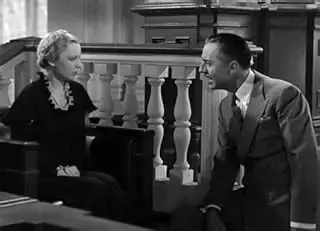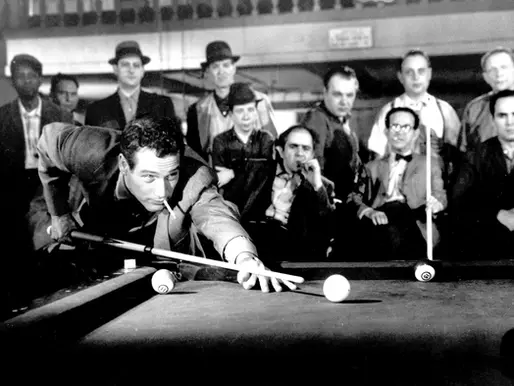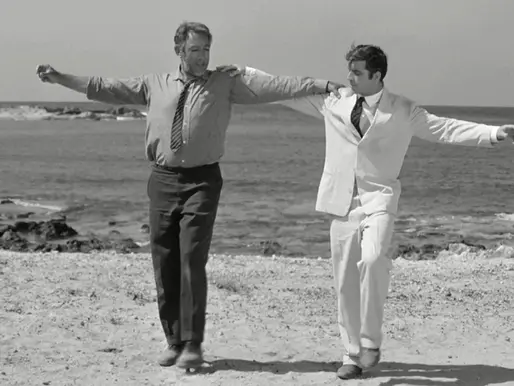top of page
Search
Drama
Classic Drama Films from 1930 - 1999


The Great Ziegfeld (1936)
Released by MGM in 1936 and directed by Robert Z. Leonard, The Great Ziegfeld is a sprawling, opulent biographical musical-drama chronicling the life and legacy of Broadway impresario Florenz Ziegfeld Jr. Starring William Powell in the titular role, alongside Myrna Loy as Billie Burke and Luise Rainer in an Oscar-winning performance as Anna Held, the film is a landmark in Golden Age Hollywood—both for its lavish production and for its place in cinematic history.

Soames Inscker
3 min read


Evelyn Prentice (1934)
While William Powell and Myrna Loy are best remembered for their sparkling chemistry in comedies like The Thin Man series, Evelyn Prentice (1934) offers a fascinating early glimpse of the duo in a markedly different light.

Soames Inscker
3 min read


The Man Who Shot Liberty Valance (1962)
The Man Who Shot Liberty Valance (1962) is not just one of John Ford’s greatest films—it is one of the most introspective and politically astute Westerns ever made. A masterful late-career work from the director who helped define the genre, the film reconsiders the mythology of the American frontier and asks hard questions about the cost of civilization, the nature of heroism, and the truth behind legend.

Soames Inscker
5 min read


The Hustler (1961)
The Hustler (1961) is more than just a film about pool—it’s a powerful, haunting character study about pride, obsession, and the elusive nature of integrity.

Soames Inscker
4 min read


La Dolce Vita (1960)
Federico Fellini’s La Dolce Vita is one of the most iconic and influential films in the history of cinema. Released in 1960, it marked a profound departure from traditional narrative and moral storytelling, signaling the arrival of a new, modernist era in European film. A kaleidoscopic journey through seven days and nights in Rome’s decadent elite society, the film is not only a portrait of a changing Italy but also a timeless meditation on meaning, excess, and the pursuit of

Soames Inscker
4 min read


The Birds (1963)
The Birds (1963) is Alfred Hitchcock’s most enigmatic and unsettling film—an apocalyptic thriller cloaked in the skin of a psychological drama. Unlike his earlier masterworks such as Psycho or Rear Window, The Birds defies easy classification. It begins like a sophisticated romantic comedy, morphs into a slow-burn psychological mystery, and then erupts into one of cinema’s most unique horror spectacles: nature turned predator.

Soames Inscker
5 min read


Journey to Italy (1954)
Roberto Rossellini’s Journey to Italy (Viaggio in Italia) is a landmark of 1950s European cinema and an early example of the modernist, character-driven narrative that would come to define the art film movement.

Soames Inscker
5 min read


Zorba the Greek (1964)
Zorba the Greek, directed by Michael Cacoyannis and released in 1964, is a cinematic adaptation of the 1946 novel by celebrated Greek writer Nikos Kazantzakis. This poignant and spirited film remains one of the most iconic works in world cinema, largely due to its rich emotional narrative, stirring performances, and evocative use of music and landscape. Anchored by Anthony Quinn’s legendary portrayal of the exuberant Alexis Zorba, the film is a meditation on the complexities

Soames Inscker
4 min read


Ulysses (1954)
Ulysses (1954), a lavish Italian-American co-production directed by Mario Camerini, represents one of the most ambitious attempts of the postwar era to bring Homer’s Odyssey to the silver screen. Starring Kirk Douglas in the titular role, this film blends classical myth, mid-century cinematic spectacle, and psychological depth to retell one of literature’s most enduring epics.

Soames Inscker
5 min read


East of Eden (1955)
East of Eden (1955) is a landmark in American cinema, notable not only for its powerful adaptation of John Steinbeck’s novel but also for introducing James Dean to the screen in a performance that changed the trajectory of American acting.

Soames Inscker
5 min read


The Rack (1956)
The Rack (1956) is a somber, intelligent courtroom drama featuring one of Paul Newman’s earliest and most emotionally raw performances. Based on a teleplay by Rod Serling (of The Twilight Zone fame) and adapted for the screen by Stewart Stern, the film grapples with the psychological toll of war and the moral ambiguity surrounding courage and duty.

Soames Inscker
5 min read


The Walls of Jericho (1945)
The Walls of Jericho (1948) is a richly textured post-war melodrama, directed by John M. Stahl, and featuring an ensemble of major studio-era talents including Cornel Wilde, Linda Darnell, Anne Baxter, and a young, rising Kirk Douglas.

Soames Inscker
5 min read


A Kind of Loving (1962)
A Kind of Loving (1962) is one of the defining films of the British New Wave or "kitchen sink realism" era—a movement in late 1950s and early 1960s British cinema that brought working-class life, unvarnished social themes, and emotional honesty to the screen. Directed by John Schlesinger in his feature debut and starring Alan Bates in one of his earliest leading roles, the film adapts Stan Barstow’s novel with a mixture of grim realism and emotional subtlety.

Soames Inscker
5 min read


Bright Eyes (1932)
Bright Eyes (1934) is a beloved showcase for Shirley Temple, the most iconic child star in Hollywood history. Released during the depths of the Great Depression, the film offered audiences a blend of sentimentality, humour, and escapist charm at a time when morale across America was desperately low. Directed by David Butler and written by William M. Conselman, Bright Eyes is most remembered for introducing Temple’s signature song, “On the Good Ship Lollipop,”.

Soames Inscker
5 min read


Only Angels Have Wings (1939)
Only Angels Have Wings (1939) is one of the most defining and enduring films of the Golden Age of Hollywood. Directed by Howard Hawks and featuring a remarkable cast led by Cary Grant and Jean Arthur, the film is a rich mixture of adventure, romance, drama, and moral clarity, set against the thrilling—and perilous—backdrop of South American mail aviation.

Soames Inscker
6 min read


In Harms Way (1965)
In Harm’s Way (1965) is a sweeping World War II epic that blends intimate human drama with large-scale naval warfare, bringing together a powerhouse cast under the direction of Otto Preminger. With John Wayne and Kirk Douglas headlining, the film explores themes of duty, honor, loss, and redemption against the backdrop of the early years of the Pacific War, particularly around the time of the attack on Pearl Harbour.

Soames Inscker
5 min read


Batman (1989)
Tim Burton’s Batman (1989) stands as one of the most influential comic book films of all time. Released during a period when superhero movies were mostly campy or low-budget affairs, Batman redefined the genre with its darker tone, gothic aesthetic, and a sophisticated, noir-inflected narrative. It was not only a box-office smash but a cultural phenomenon, sparking “Batmania” across the globe and proving that comic book adaptations could be serious, stylish, and commercially

Soames Inscker
5 min read


The Parent Trap (1961)
Walt Disney’s The Parent Trap (1961) remains a beloved classic of family cinema, notable for its engaging blend of comedy, romance, and heartwarming family themes. Featuring Hayley Mills in a groundbreaking dual role as long-lost twin sisters, the film was both a critical and commercial success upon its release and has since endured as one of Disney’s most charming live-action productions.

Soames Inscker
5 min read


12 Angry Men (1957)
12 Angry Men (1957) stands as one of the most powerful and enduring courtroom dramas in the history of American cinema. Directed by Sidney Lumet in his feature film debut and based on the teleplay by Reginald Rose, the film explores justice, prejudice, and the power of reason—all within the confines of a single jury room.

Soames Inscker
5 min read


Joan of Arc (1948)
Joan of Arc (1948) was a passion project for both its star Ingrid Bergman and its producer Walter Wanger. Directed by Victor Fleming (of Gone with the Wind and The Wizard of Oz fame), the film was a grand, Technicolor retelling of the life and martyrdom of France’s iconic heroine.

Soames Inscker
5 min read
bottom of page


